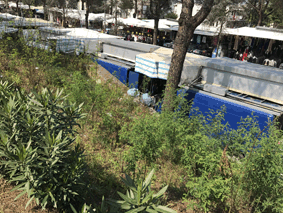UIA and the MAC project: green city and multi-ethical connections for Monteruscello neighbourhood. Pozzuoli case study
DOI:
https://doi.org/10.6092/2281-4574/5316Keywords:
Nature, economics, youth entrepreneurship, rural urban landscape, urban sustainable developmentAbstract
The identification of cities as the main engine of development and the awareness that their role is decisive in completing the objectives of the European Urban Agenda 2030 is one of the basic aspects recently affirmed by the European Community. The cities, the cause and, at the same time, the solution to the economic crisis, are faced with a diligent and complex challenge that has a dual role: on the one hand, the management of critical issues such as reception, social integration of migrants, urban poverty, availability of affordable housing, demographic change not only in quantitative aspects, but also in its composition; on the other, to guarantee a high level of well-being both in the natural and anthropic environment, but especially in the community that lives there, relationships, emotions and relationships. The new European methodology allows you to experience the role of leadership that has long held the city at institutional level and at the same time facilitates the difficult task of involving and co-ordinating all the public and private actors of the new urban economies that will have to participate in the construction and implementation of shared urban regeneration projects. This contribution investigates the implementation tools of European urban policies and describes the case study of the city of Pozzuoli, in the province of Naples, and the strategy it will adopt, within the European UIA program, to operate urban regeneration in one of the most the poor of the city, and socio-economic revitalization.Downloads
References
Altavilla C., Bravo E.F. (2005), “La struttura socio-economica del sistema di produzione locale dell’area flegrea”, Strategie di sviluppo integrato dei territori, il sistema locale dei Campi Flegrei, Napoli, Ed. Il mulino, 125-175,
Bruno P. (1996), “Gli insediamenti costieri a Pozzuoli tra Ottocento e Novecento”, pubblicazione degli Atti del convegno, tenutosi il 10 ottobre 1996, Napoli, pag. 87.
Cantone L. (2005), “Il modello di analisi dell’area in una prospettiva Resource-Based”, Strategie di sviluppo integrato dei territori, il sistema locale dei Campi Flegrei, Napoli, Ed. Il mulino, 177- 201
Giampaolo E. (2005), “Il bradisisma, la paura, l’amore e gli affari”, Napoli, Rivista semestrale Area vasta, n°10/11, anno 6, 295-302
Comune di Pozzuoli (2016), Application Form UIA01-540-MAC, Assessorato alla Pianificazione e Governo del Territorio
Fusco Girard L., Nijkamp P (1997), Le valutazioni per lo sviluppo sostenibile della città e del territorio, Franco Angeli, Milano
Marotta P. (2006), “Trasformazioni nelle grandi aree urbane tra il 1950 ed il 1990”, La città di Napoli” Area Vasta n°12 Napoli
Moccia F.D. (2012), Urbanistica, Interpretazioni e processi di Cambiamento, Edizioni Clean, Napoli
Scalera B. (2008), “Frammenti e fermenti dei Campi Flegrei - Pianificazione e ruolo delle connessioni urbane” in tesi di dottorato di ricerca in “Metodi di Valutazione per la Conservazione Integrata del Patrimonio Architettonico, Urbano ed Ambientale” UNIVERSITA’ DEGLI STUDI DI NAPOLI “FEDERICO II” – Dipartimento di Architettura, Napoli
Scalera B. (2009), “Strategies of integrated development in the Campi Flegrei” in Bollettino del Dipartimento di Conservazione dei Beni Architettonici ed Ambientali, Università Federico II, numero 1, Napoli
Scalera B. (2011), “Napoli città-porto: una possibile strategia di rigenerazione urbana e socio-economica / Il mare bagna Napoli! Un processo condiviso e partecipato di riqualificazione urbana della Città Bassa” Programma Urbact II in Portusplus n. 2/2011, Rivista semestrale on- line: http://www.reteonline.org , RETE, Associazione per la collaborazione tra porti e città, Venezia
Web sites
DATI ISTAT_Demografia - http://demo.istat.it/ Bilancio demografico mensile periodo gennaio-dicembre 2016
Trasformare il nostro mondo: l’Agenda 2030 per lo Sviluppo Sostenibile
http://www.unric.org/it/agenda-2030
Patto di Amsterdam
http://europa.eu/rapid/press-release_IP-16-1924_it.html
Linee Guida per gli Stati membri sullo sviluppo urbano sostenibile integrato (art. 7 del Regolamento Fesr) EGESIF_15-0010-01 del 18/05/2015 _Commissione Europea

Downloads
Published
Issue
Section
License
Gli autori che pubblicano su questa rivista accettano le seguenti condizioni:- Gli autori mantengono i diritti sulla loro opera e cedono alla rivista il diritto di prima pubblicazione dell'opera, contemporaneamente licenziata sotto una Licenza Creative Commons - Attribuzione che permette ad altri di condividere l'opera indicando la paternità intellettuale e la prima pubblicazione su questa rivista.
- Gli autori possono aderire ad altri accordi di licenza non esclusiva per la distribuzione della versione dell'opera pubblicata (es. depositarla in un archivio istituzionale o pubblicarla in una monografia), a patto di indicare che la prima pubblicazione è avvenuta su questa rivista.
- Gli autori possono diffondere la loro opera online (es. in repository istituzionali o nel loro sito web) prima e durante il processo di submission, poiché può portare a scambi produttivi e aumentare le citazioni dell'opera pubblicata (Vedi The Effect of Open Access).

